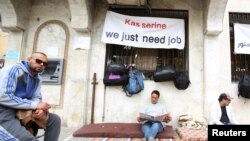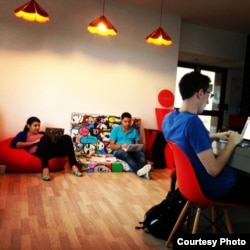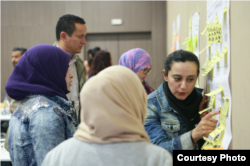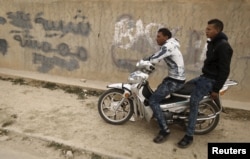Tunisia has been widely touted as the only "success story" of the 2011 Arab uprisings.
But if you ask the country’s millennials, they will tell you that poverty and joblessness are as bad today as they were in December 2010, when Mohamed Bouazizi, a 26-year-old vegetable vendor, set himself on fire and ignited rebellion across the region.
The situation is particularly grim in Tunisia’s central and south, a region that has been labeled a "hotbed" for terrorist recruitment; upwards of 7,000 Tunisian youth have set off to join the Islamic State group (IS).
But some young Tunisians are taking the problem into their own hands.
Cogite, French for “think” or “ponder,” is Tunisia’s first co-working space.
Located in a villa in the capital city Tunis, it gives entrepreneurs access to desks, the Internet, meeting spaces and the opportunity to network and share ideas.
'Tunisia is a startup'
“In a sense, all of Tunisia is a startup,” said Cogite’s co-founder Houssem Aoudi. “Youth are moving away from decades of dependence on civil service jobs to ways to make new businesses. They understand that they are their only chance for development.”
Cogite organizes workshops and cultural events and recently partnered with Mercy Corps to launch Cogite Direction Sud (“South”) to foster entrepreneurship in southern Tunisia, where IS has gained a foothold among disenfranchised youth.
“Imagine you are 25 years old without a job, without any self esteem. There are no cinemas, there is no music in the streets. And along comes ISIS, offering everything to these youth that we are failing to provide," he said, using an acronym for the group.
IS offers youth a better dream, Aoudi said, adding, “We are obliged to give them a new dream.”
It’s not a problem limited to Tunisia alone. Millennials everywhere are vulnerable.
“It really hit me hard the day after the Paris attacks, trying to think not so much about the tactics that radical groups are using to recruit youth and why these tactics are successful, but asking myself what is the void that our society is creating that makes radicalization possible,” said Ravi Hutheesing, a keynote speaker and cultural diplomat for the U.S. Department of State.
'Millennial conundrum'
Hutheesing cited what he calls the "millennial conundrum": Millennials, roughly defined as those 20 to 35 years old, have lived through 9/11,the global financial crisis and revolutions.
“Because they’ve been on this trajectory of broken promises, they want to put their own fate in their own hands,” Hutheesing said. “And this is the void that has been created that the radical groups are taking advantage of, it’s that loss of identity, that desire to be a change engine. Jihadist groups are providing something to be passionate about.”
A scary thought occurs to Huthessing: IS itself is an entrepreneurial enterprise.
Elmira Bayrasli wears a lot of hats: She is visiting fellow at the New America Foundation and a lecturer at New York University. She co-founded Foreign Policy Interrupted, an education and media startup that amplifies the voices of women in foreign policy. And she’s author of From the Other Side of the World: Extraordinary Entrepreneurs, Unlikely Places.
Critical need
Bayrasli believes entrepreneurship is critical in the world’s trouble spots.
“We often look at conflict and automatically believe the solution either has to be military or development aid. When, in fact, the people who are actually victims of these conflicts who are on the ground actually know what they need best,” she said.
She cites the U.S. State Department’s Global Innovation through Science and Technology (GIST) initiative, organized after U.S. President Barack Obama delivered his 2009 A New Beginning speech in Cairo.
GIST offers training and financing for young entrepreneurs across the globe.
More programs like these are needed, Bayrasli said.
“But because of all these big crises and issues that have come up, whether in Syria, Iraq, and now unfortunately in Ankara and Belgium, I think what diplomats are now focused on is putting out those fires, rather than actually looking at entrepreneurship as a long-term tool to actually prevent these types of incidents,” she said.







